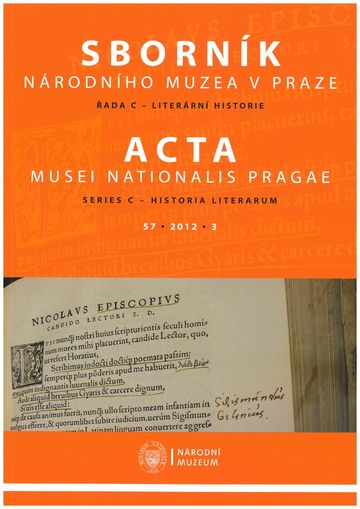
2012/57/3
ISSN : 0036-5351
Vedoucí redaktor : PhDr. Jaroslava Kašparová, Ph.D.
Vedoucí redaktor : PhDr. Jaroslava Kašparová, Ph.D.
Faber Stapulensis: philosophus, «humanista theologizans»
Jean-Marie Flamand
Les nombreuses productions de Jacques Lefèvre d’Étaples (c. 1460-1536) se répartissent en deux pôles principaux. Au début de sa carrière (à partir de 1492), Lefèvre a donné principalement des éditions et des commentaires d’Aristote (physique, logique, éthique), en lien direct avec son…
Musuro «trasmettitore di testi».Qualche considerazione
Luigi Ferreri
L'étude porte sur l’activité d’enseignant de Marc Mousouros (Musurus) et sur son travail de philologue. Elle met d'abord en relief la grande valeur de l'enseignement de Mousouros pour le développement de la connaissance du grec en Europe et montre les liens entre sa méthode et la tradition…
’Barbaric and uneducated’? Modesty unveiled in the vernacular editions by Cornelis Van Ghistele and Dirck Coornhert
Steven Surdèl, Henk Nellen
The article pays attention to the first two Early Modern translators of classical authors in the Low Countries; one a cooper named Cornelis van Ghistele, a member of one of the local chambers of rhetoric, living in Antwerp during the years before the Protestant Revolt against the Spanish…
Czech National Humanism
Bořek Neškudla
The paper focuses the problem of adoption of humanism and classic antiquity in Czech society after the Hussite revolution. The Czech milieu featured specific social and cultural background. The society was divided by religous confessions and very suspicious to foreign influences. Therefore…
„Durchschnittliche“ Gelehrtenpraxis im Humanismus nördlich der Alpen? Der Umgang mit Homers und Vergils Epen in den Prager Universitätsvorlesungen des Matthaeus Collinus im Jahr 1557
Lucie Storchová
The literary field of the University of Prague was established later than in imperial regions (during the late 1540s); from the point of view of literary techniques and communicational media (such as occasional poetry) it apparently took shape under the direct influence of the Saxon…
Politique culturelle princière ou transmission humaniste de textes? Critères d’évaluation de l’activité des humanistes transylvains au tournant des 16e–17e siècles
István Monok
La guerre de quinze ans est considerée comme un tournant dans l’histoire culturelle de la Hongrie : cette période avait sans doute déterminé les tendances ultérieures. Afin de prendre la mesure et de comprendre les conséquences de la destruction, l’étude fournir ici la présentation rapide…
Des livres qui parlent: paratexte et publicité au début du 16e siècle
Farkas Gábor Kiss
As the number of published books multiplied during the second half of the 15th century, printers and editors were constantly in search of new methods to raise public attention to the own publications, and ultimately, to have the readers buy their books. Paratexts (dedications, dedicatory…
Der Philologe und Übersetzer Zikmund Hrubý z Jelení, gen.Gelenius (1497–1554). Ein Porträt
Klara Vanek
Nach einer humanistischen Ausbildung in Italien wirkte der in Prag geborene Gelenius seit 1524 als Korrektor in der Basler officina Frobeniana. Er arbeitete mit Erasmus und Rhenanus zusammen und stand mit Melanchthon und Camerarius im Briefwechsel. Bis auf seine Sprachharmonie Lexicon…
De Hislampa a Porthum. De la delimitación del corpus del humanismo en Portugal
Ana María Sánchez Tarrio
Given the present stage of specific research on Portuguese Humanism, the work on inventories of ancient authors transmitted by Portuguese humanistic activity demands prior elucidation of the humanistic field and its research in Portugal, in order to produce monographs about the specific…
Los comentaristas de Aristóteles en la Nueva España: siglos XVI y XVII. Aspectos teóricos sobre la consideración del humanismo novohispano
Teresa Rodriguez, Ernesto Priani
Les commentateurs d’Aristote en Nouvelle Espagne aux XVIe et XVIIe siècles. Dans ce rapport, on cherche à donner une description générale du travail de choix et de documentation des humanistes qui commentent le texte d’Aristote et sont actifs en Nouvelle-Espagne aux XVIe et XVIIe siècles.…
La polémica entre Erasmo y los humanistas españoles sobre su edición del Nuevo Testamento
Francisco Lisi
The polemic between Erasmus, López de Zúñiga and Sepúlveda originated, probably, in the defence of the edition of the Polyglot Bible in Alcalá. Later it degenerated in accusations against Erasmus of promoting Lutheranism. However, the Complutensian Polyglot shows two very different…
The Czech New Testament of 1533
Robert Dittmann
Der Beitrag beschäftigt sich mit dem Neuen Testament, das in Náměšť im Jahre 1533 gedruckt wurde, und zwar vor allem mit der Identifizierung der genauen lateinischen Vorlage, mit den Proben der Eigennamen und teilweise auch mit den Marginalien.
Der Beginn der Griechischstudien im Wiener Humanismus an der Wende vom 15. zum 16. Jahrhundert
Christian Gastgeber
L’idéal d’une double langue, latine et grecque, provenant de l’humanisme italien, a été introduit outre-Alpes par les étudiants et les érudits. Vienne, contrairement à Bude et ses érudits italiens, n’était pas en mesure d’inaugurer des études grecques avant l’arrivée de Conrad Celtis,…
Die Editionen byzantinischer Rechtstexte des Dionysius Gothofredus (1549–1622). Eine Untersuchung ihrer Paratexte
Michael Hanstein
His editions of Byzantine texts represent only a small selection of the works of Dionysus Gothofredus. The professor of law used the success of his most famous oeuvre, the Corpus Juris Civilis, to publish corresponding sources of the Byzantine tradition whose paratexts served to achieve…
